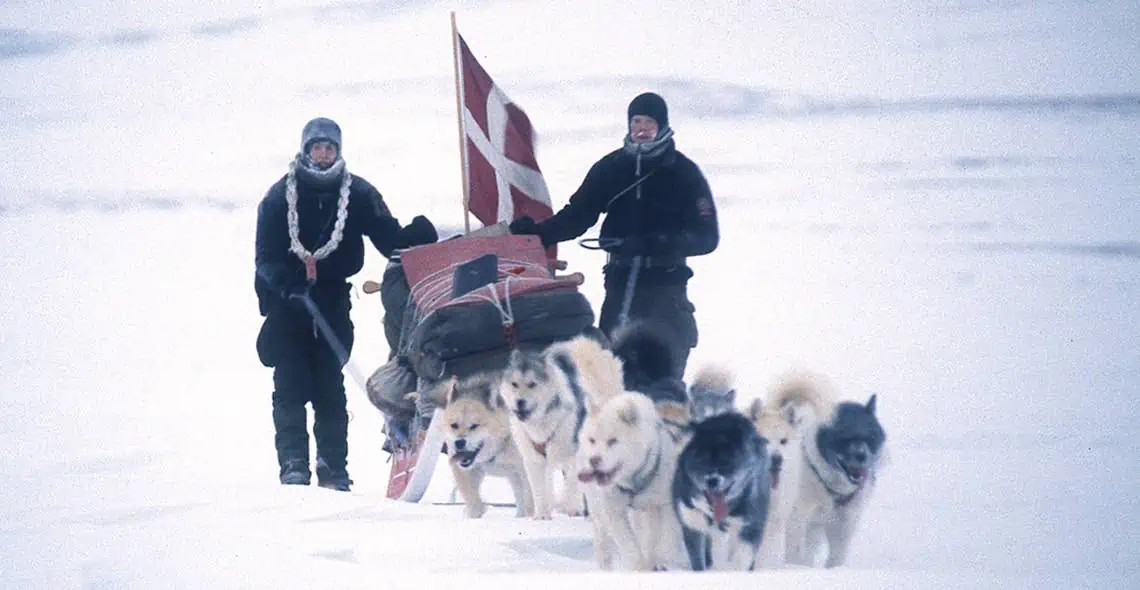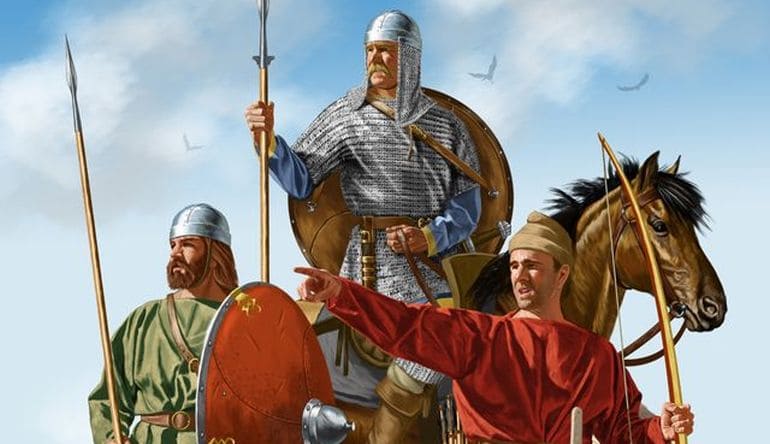
⚓Nimis Audax Mundo, Nimis Stultus Caelo.
Master's in biology at Aarhus University & Co-founder of @theextinctions
11 subscribers
How to get URL link on X (Twitter) App


https://twitter.com/visegrad24/status/2008375351718691188Both funny and tragicomic because the Danes have indeed more or less totally forgotten about, and stopped caring about, the actual reasons why we own Greenland - but previously that was merely the cause of domestic squabbles with Inuit separatist. Now it's a geopolitical issue.

 3. While Sámhain is attested as a festival in pre-Christian Ireland, there is no evidence of special associations with the dead during the pagan period.
3. While Sámhain is attested as a festival in pre-Christian Ireland, there is no evidence of special associations with the dead during the pagan period.



 This is a genuinely strange phenomenon - there is a remarkable coalescence between the "style" of cosmology found among Papuans, Amazonians and certain Congolese tribes, all extremely distantly related but united by a common climate and lifestyle. Yet this "vegetable garden spirituality," though highly consistent among similar rainforest-dwelling Neolithics, is markedly aberrant compared to what we see both among true hunter-gatherers and more complex societies.
This is a genuinely strange phenomenon - there is a remarkable coalescence between the "style" of cosmology found among Papuans, Amazonians and certain Congolese tribes, all extremely distantly related but united by a common climate and lifestyle. Yet this "vegetable garden spirituality," though highly consistent among similar rainforest-dwelling Neolithics, is markedly aberrant compared to what we see both among true hunter-gatherers and more complex societies.


 Most people probably don't realize - I certainly didn't, originally - that the Gaulish language was still widely spoken throughout Gallia at the time of the Frankish conquest. It was the *Franks*, ironically, who completed the "Romanization" process.
Most people probably don't realize - I certainly didn't, originally - that the Gaulish language was still widely spoken throughout Gallia at the time of the Frankish conquest. It was the *Franks*, ironically, who completed the "Romanization" process. 


 It should be self-evident that we cannot simply derive from this a reverse principle, and conclude that wherever contemporary archaeologists denied a purported migration, it really did take place - yet the scope of the discrediting is remarkable.
It should be self-evident that we cannot simply derive from this a reverse principle, and conclude that wherever contemporary archaeologists denied a purported migration, it really did take place - yet the scope of the discrediting is remarkable.

 >Knight is recorded as composing a poem to persuade his captor lord to free him:
>Knight is recorded as composing a poem to persuade his captor lord to free him:

https://twitter.com/HMBrough_/status/1895917687966249184It is an interesting quirk of the global export of the nation state system that we aren't really able to account for "unorganized regions" anymore. With the exception of Antarctica, every plot of land *must* be attached to a specific polity with a government and a flag.




 In a world of limited time, I've come around to the realisation that 8/10 times, instead of reading a book ABOUT Shakespeare, read Shakespeare. Read Plato. Just read that book you want to get to, don't read endless books ABOUT reading that book.
In a world of limited time, I've come around to the realisation that 8/10 times, instead of reading a book ABOUT Shakespeare, read Shakespeare. Read Plato. Just read that book you want to get to, don't read endless books ABOUT reading that book. 

https://twitter.com/cobbaltt/status/1888627058110333100Obviously there's no such thing as an "Indo-European race" - Indians, Afghans, Kurds, Spaniards, Germans and Lithuanians are not all part of one esoteric, "hyperborean" identity. But the original PIE-speakers would indeed have been a particular tribe or cluster of related tribes.

 Truth claims are truth claims - it is not "kind" or "respectful" to treat these as ultimately irrelevant, and indeed doing so is ultimately a sign of supreme arrogance and contempt, since you don't even consider it worth *looking at* whether said beliefs are correct.
Truth claims are truth claims - it is not "kind" or "respectful" to treat these as ultimately irrelevant, and indeed doing so is ultimately a sign of supreme arrogance and contempt, since you don't even consider it worth *looking at* whether said beliefs are correct.



 Even to this day, and despite the droves of recent evidence, a very profound squeamishness still surrounds this topic for many academics.
Even to this day, and despite the droves of recent evidence, a very profound squeamishness still surrounds this topic for many academics.https://x.com/Hieraaetus/status/1840756105552498901


 Their origins, though, are wildly different. The American Christmas elves derive from mid-19th-century children's literature, and tend towards the very twee and saccharine: they're often associated with the colour green, and portrayed as childlike.
Their origins, though, are wildly different. The American Christmas elves derive from mid-19th-century children's literature, and tend towards the very twee and saccharine: they're often associated with the colour green, and portrayed as childlike. 


 Those who think otherwise generally suffer simply from limited reading:
Those who think otherwise generally suffer simply from limited reading: 




 Consider gravity, gravitational theory - practically everyone in the modern West believes in it, but what precisely does it mean for a worldly, practically-minded farmer in Idaho to believe in gravity? In what sense does he believe in it? Because he knows things fall down?
Consider gravity, gravitational theory - practically everyone in the modern West believes in it, but what precisely does it mean for a worldly, practically-minded farmer in Idaho to believe in gravity? In what sense does he believe in it? Because he knows things fall down?

 There is a level at which much folk horror does seemingly reduce to "naive urbanite goes into the countryside, bad things happen" - horror essentially deriving from a semi-exoticising, semi-othering view of rural life. Midsommar is largely this, and I dislike it rather strongly.
There is a level at which much folk horror does seemingly reduce to "naive urbanite goes into the countryside, bad things happen" - horror essentially deriving from a semi-exoticising, semi-othering view of rural life. Midsommar is largely this, and I dislike it rather strongly.


 It is at this point a fairly well-known fact that a small population of woolly mammoths survived on Wrangel Island in the Arctic Ocean until only around 1600 BC, a thousand years after the building of the Pyramid of Giza.
It is at this point a fairly well-known fact that a small population of woolly mammoths survived on Wrangel Island in the Arctic Ocean until only around 1600 BC, a thousand years after the building of the Pyramid of Giza. 


 The term 'kongsi' (公司) is not a Mandarin Chinese word, but instead from Hokkien, a Chinese language spoken primarily in southeastern Fujian, while the related form 'Kung-sze' exists in Hakka, another regional Sinitic language spoken in the south.
The term 'kongsi' (公司) is not a Mandarin Chinese word, but instead from Hokkien, a Chinese language spoken primarily in southeastern Fujian, while the related form 'Kung-sze' exists in Hakka, another regional Sinitic language spoken in the south.


 (2) With 200+ million speakers, the Swahili language is spread today across a vast swathe of eastern Africa, serving as the main national language in Tanzania and (alongside English) in Kenya, and with a growing presence in Uganda, Rwanda, Burundi and the eastern Congo.
(2) With 200+ million speakers, the Swahili language is spread today across a vast swathe of eastern Africa, serving as the main national language in Tanzania and (alongside English) in Kenya, and with a growing presence in Uganda, Rwanda, Burundi and the eastern Congo. 

 The prophecy is part of the Bene Gesserit's 'Missionaria Protectiva', a panoply of false superstitions planted across the galaxy to aid the Bene Gesserit sisters in their grand breeding project, should they need help on a given world, by providing them leverage to manipulate.
The prophecy is part of the Bene Gesserit's 'Missionaria Protectiva', a panoply of false superstitions planted across the galaxy to aid the Bene Gesserit sisters in their grand breeding project, should they need help on a given world, by providing them leverage to manipulate. 

 To be clear, I am also v wistful about the passing of the old countryside and rural traditions, and Akenfield is certainly full of old-timers mourning the passing of many venerable and beautiful things.
To be clear, I am also v wistful about the passing of the old countryside and rural traditions, and Akenfield is certainly full of old-timers mourning the passing of many venerable and beautiful things.